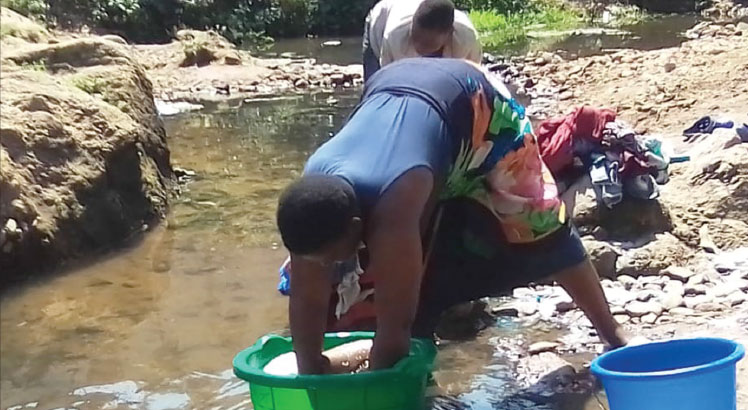Water scarcity fuels cholera among peri-urban poor
As cholera spreads like bush fire nationwide, unsafe water sources are proving deadly for the urban poor amid dwindling access to potable water.
In Blantyre, the epicentre of the outbreak where 21 people have died of cholera this year and with over 536 cases registered, the situation is critical.
The Nation team yesterday visited a water source in Bangwe Township, the commercial capital’s cholera hotspot, to check the water sources for some residents.

There, a local stream that carries faecal matter and is heavily polluted with plastics and other waste is the main source of water.
With the rainy season long gone, the stream is also fast drying up and water is available in spots clogged with moss. You can smell the pungent odour.
Bangwe Township resident Dorothy Saidi said last Saturday was a day like any other and she went to draw water from a river residents call Namichimba.
She said she mostly uses that water for washing clothes and mopping the house. For cooking, she said she draws water from a borehole some 10 minutes walk from her home.
Sometimes, like that day, the mother of one used some water from ‘Namichimba’ to wash her plates. She said she suspected nothing until after lunch when she and her husband, Mayeso, started vomiting heavily and had running stomachs.
The couple and their son were rushed to Bangwe Health Centre where they were the only patients when The Nation visited the place yesterday.
Her husband, who works as a tailor, was still too weak to speak. However, Dorothy said they were both recuperating, although she was not sure of her 11-year-old son’s situation.
“To get water at the borehole is a struggle and one has to go very early. That is the water we normally use for cooking. But on Saturday, I used the water from the stream to wash the plates,” she said.
During a spotcheck of ‘Namichimba’ stream, The Nation found some residents in various activities such as washing clothes and drawing water in pales.
One of them, Tadala Kamba, said they had no option, but to use the untreated water despite calls by health officials not to use the water.
“What can we do? They came and tested the water and they told us it is unsafe. They gave us no options. Even though some people have taps, sometimes they are dry for three days on end,” she said.
Further downstream, Aisha Kulosi said apart from dry taps and lack of boreholes, the price of water also forces them to draw water from the stream.
She said: “During the dry season, the stream is clogged. During the rainy season, we still use the stream although waste from upstream is evident. If I were to draw water from the private taps, I would need K500 daily for clean water. Our sources of income can’t meet that.”
The situation is similar in Ndirande Township where interviews with some residents in one section of the densely populated areas of the township, Safarao, revealed that the water shortages are worsened by electricity blackouts amid insufficient generation capacity.
The residents affirmed that when the taps, including communal ones, run dry, they go and draw water at Tithandize Orphan Care, whose executive director Zex Thambo is pumping water from Ndirande Mountain. He has been doing so since 2004.
“The plan came in 1996 because at the time women were being raped, robbed and beaten by thugs in the forest when they went to draw water.
“Right now we pump at least 8 000 litres a day and by 8am from 4am when we open up, the small tank is dry,” he said.
Thambo said he wished he had more resources for a bigger tank to treat the water.
He said: “Right now, I tell the people that no matter how clear the water appears, they need to boil it or use chlorine.”
At both Blantyre and Limbe markets, vendors felt betrayed on sanitation, saying government needed to solve water scarcity and sanitation problem, amidst the cholera crisis.
Limbe Market chairperson Maggie Jere said the facility has four taps only that all the vendors depend on.
She said: “The condition has been made worse with the irregular water supply that the city is having.”
Blantyre Water Board said in a statement on Thursday that water pumping is often affected when Electricity Generation Company carries out maintenance works at Walker’s Ferry where most of the water is pumped into the city.
Health system consultant Professor Maurine Chirwa blamed the ministry’s failure to prepare adequately for the pandemic, saying the outbreak has exposed weaknesses in the provision of water, sanitation and hygiene services.
“It is disappointing that we are failing to control cholera this time when this is not the first time to experience the outbreak.
“The problem is that we focus on treatment rather than preventing. Our priorities are not right,” she said.
But Minister of Health Khumbize Kandodo Chiponda assured in a statement on Wednesday that her ministry is working with the Ministry of Water and Sanitation to ensure that all people have safe water all the time.
She said: “Some among the measures to contain the outbreak include; setting up of treatment centres in all affected areas so that patients do not travel long distances for treatment, pot-to-pot chlorination of water in the communities where there is no safe water.”
Chiponda further said the Ministry of Water and Sanitation is also in the process of putting safe water sources in the community and intensifying administration of oral cholera vaccinations.
Despite the interventions, the outbreak has continued to spread to 18 districts in the country with cases hitting 2 012 and 75 death.






One Comment